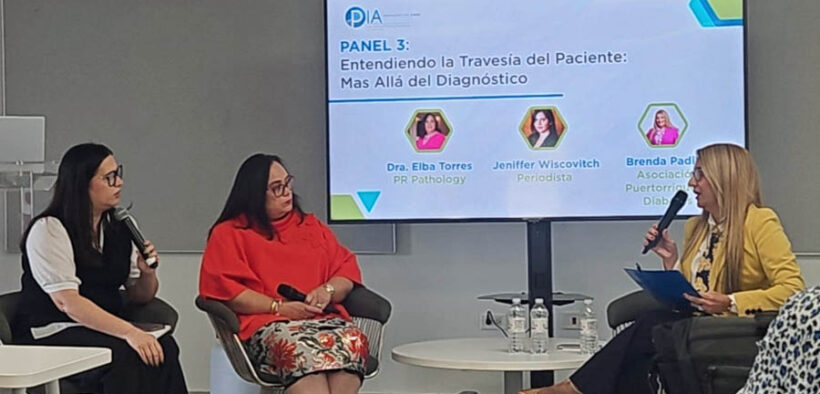Journalists stress empathy, access in health coverage

The importance of access to public information and understanding the origins of the Medicare and Medicaid programs were among the topics discussed last week during a forum for journalists and journalism students in San Juan.
The event, organized by the Pharmaceutical Industry Association (PIA) and hosted by journalist Nadesha González, examined the media’s role in informing the public about health issues and the experiences of patients navigating the health care system.
“In the past, health issues [in the media] were addressed incidentally and more from an oversight perspective, such as when funding cuts occurred,” said Normando Valentín, anchor reporter for WAPA TV, who moderated the event. “Now they have a regular slot, with specific topics on prevention, medical advances and the role of doctors. These are relevant stories that matter to the public. I would venture to say that health issues are among the top three [most watched] in the media.”
During the forum, held at Universidad del Sagrado Corazón (Sacred Heart University), journalist Luz Nereida Vélez, also of WAPA TV, noted that more people are now willing to share their health experiences publicly and seek help through the media.
“It should not be the case that someone has to wait six months for a doctor’s appointment,” she said, adding that she has seen medicine evolve over the course of her career.
Journalist and attorney Mardelis Jusino, host of the podcast “El Consultorio,” said access to public information related to health remains fragmented, complicating efforts to obtain reliable data. She also warned about “digital noise,” or misinformation circulating on social media that many users take as “gospel truth.”
Jusino, Vélez and freelance journalist Marga Parés, another panelist, agreed that some government health information is accessible and well maintained. They cited the Health Department’s Suicide Prevention Commission website as one of the few examples that is “fairly up to date” and “well analyzed.”
Parés highlighted concerns over Senate Bill 63, which seeks to amend Puerto Rico’s Transparency and Expedited Procedure for Access to Public Information Act. She said the measure could impose new barriers to public data and affect not only journalists but also citizens seeking official information.
She emphasized that data strengthens news coverage and public complaints, and she underscored the importance of humanizing stories whenever possible.
Panelists also discussed artificial intelligence, calling it a “double-edged sword” that can aid reporting but also introduce errors. They advised journalists not to rely entirely on automated tools.
A second panel brought the patient perspective. Elba Torres, of Puerto Rico Pathology, gave an emotional testimony emphasizing that education and knowledge empower patients, giving them “confidence, security and hope.”
Journalist Jennifer Wiscovitch, from “Es Mental,” underscored the need for empathy when reporting on mental health and said that listening carefully to interviewees can help reduce stigma. “The families [of patients] are also greatly affected by the process,” she said, adding that journalists should put themselves in the shoes of those they interview.
Brenda Padilla, executive director of the Puerto Rican Diabetes Association, lamented the lack of a prevention culture in mental health, noting that many seek help only once a crisis arises. She encouraged journalists to stay informed and consult experts to ensure accuracy.
Meanwhile, Hari Sabnani, of Alivia Health, and Luis Pizarro, of FIDE LLC, explained key differences between Medicare and Medicaid benefits in Puerto Rico and the U.S. mainland. They noted that 61% of Puerto Rico’s population depends on these programs, including traditional Medicare, Medicare Advantage and Medicaid.
“We pay the same taxes [as in the United States], but in terms of premiums, we do not have the same benefits,” Sabnani said.
Pizarro warned about the ongoing loss of doctors to higher-paying jobs abroad, saying salaries elsewhere can be up to three times greater than those offered in Puerto Rico.
The event included emotional testimonies from journalists Zoraida Nelly Torres and Jorge Muñiz Ortiz, who shared their personal experiences having faced cancer diagnoses.




